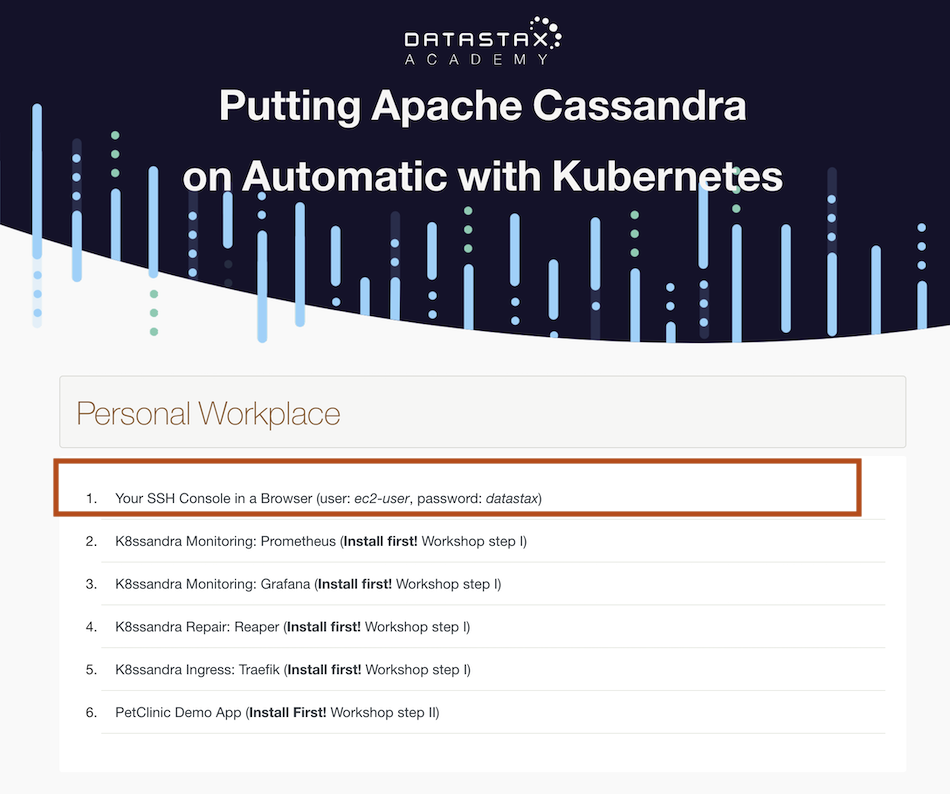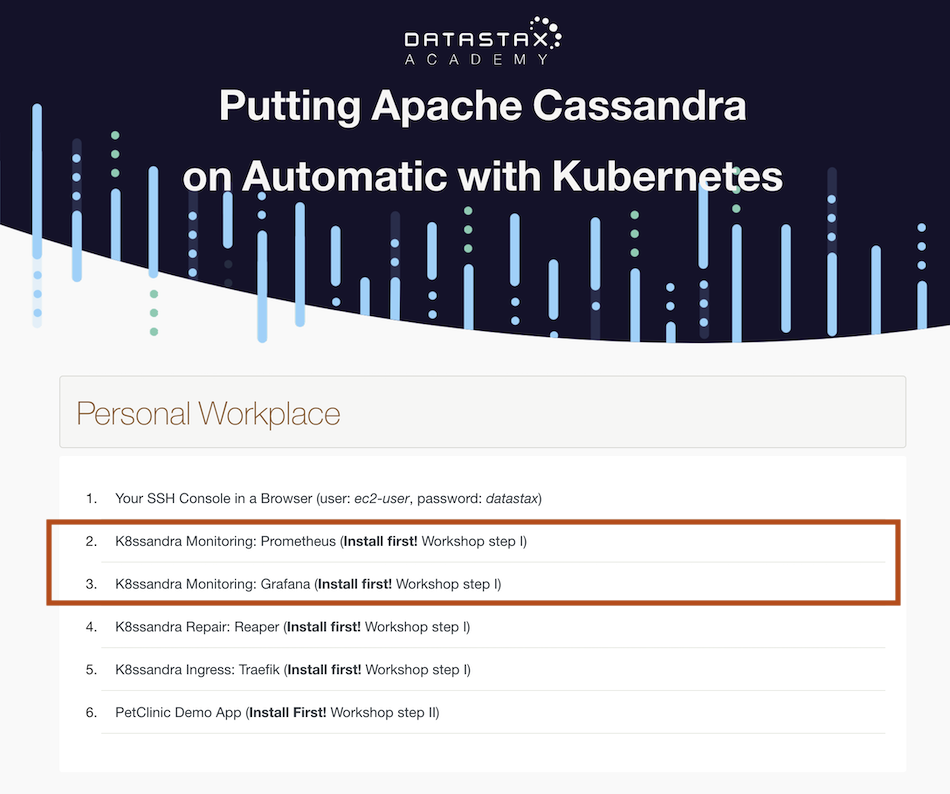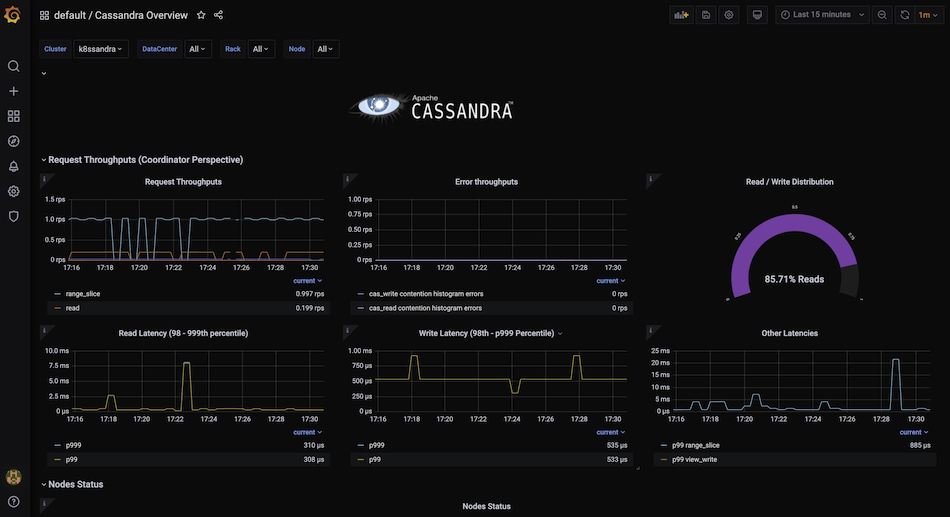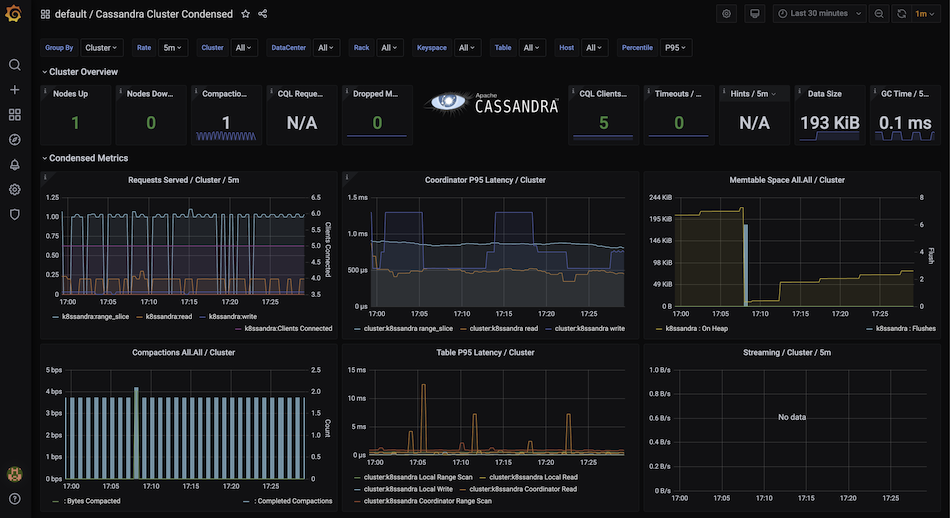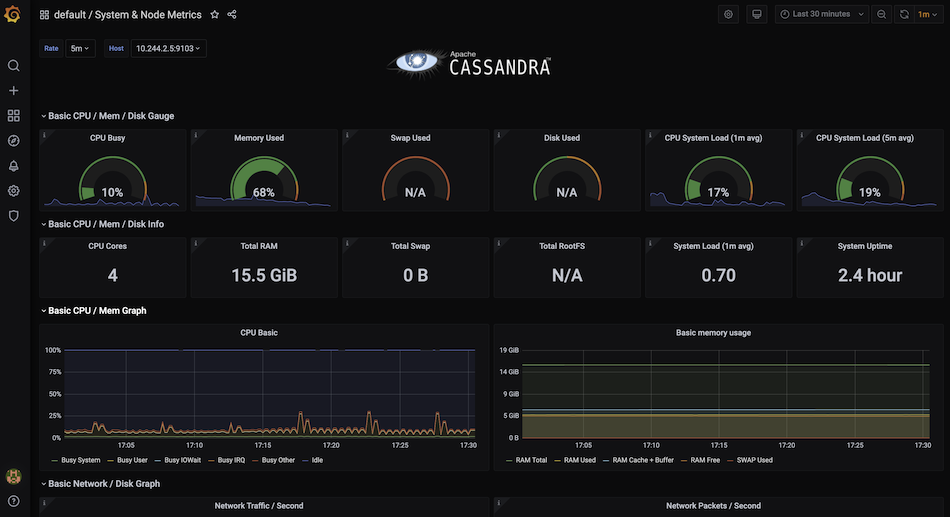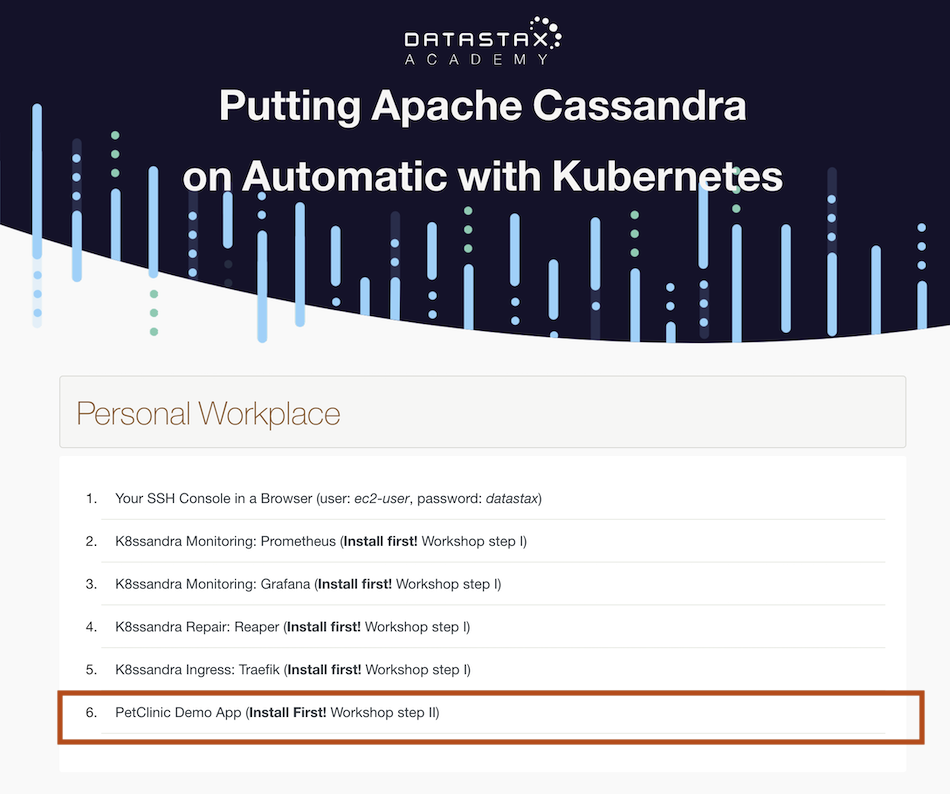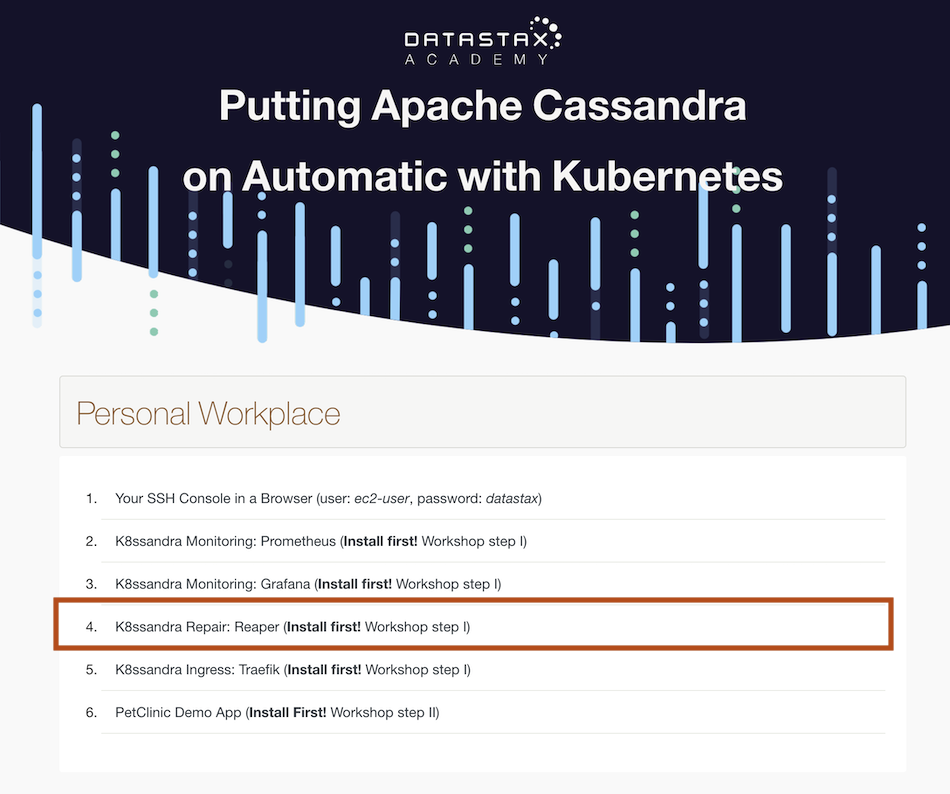In this repository, you'll find everything for the Cassandra Kubernetes Workshop: Feel free to bookmark this page for future reference!
To follow along with the hands-on exercises during the workshop, there 2 possibilities
+ PROVIDED CLOUD INSTANCESKubeCon attendees can request a training cloud instance using this link.
Notice that training cloud instances will be available only during the workshop and will be terminated 24 hours later. If you are in our workshop we recommend using the provided cloud instance, you can relax as we have you covered: prerequisites are installed already.
⚡ IMPORTANT NOTE:
Everywhere in this repo you see <YOURADDRESS> replace with the URL for the instance you were given.
+ LOCALLYIf you are doing this on your own using your own computer or your own cloud node, please check the requirements and install the missing tools as explained Here. You need to have a docker-ready machine with at least a 4-core + 8 GB RAM.
| Title | Description |
|---|---|
| 1 - Setting Up and Monitoring Cassandra | Instructions |
| 2 - Working with Data | Instructions |
| 3 - Scaling Up and Down | Instructions |
| 4 - Running Repairs | Instructions |
| 5 - Resources | Instructions |
First things first. Helm documentation is kind of like a high powered package manager for Kubernetes. In order to use the packages for todays workshop we will need to first add the correct repositories for helm to use.
We will pull recipies from https://helm.k8ssandra.io/ where you can find all the documentation.
✅ Step 1a:Open your image and select the first link to go the shell
Credentials to use the shell
Username: ec2-user
password: datastax✅ Step 1b: Add the repository to Helm
helm repo add k8ssandra https://helm.k8ssandra.io/📃output
ec2-user@ip-172-31-5-5:~/kubernetes-workshop-online> helm repo add k8ssandra https://helm.k8ssandra.io/
"k8ssandra" has been added to your repositories ✅ Step 1c: Update helm
helm repo update📃output
ec2-user@ip-172-31-5-5:~/kubernetes-workshop-online> helm repo update
Hang tight while we grab the latest from your chart repositories...
...Successfully got an update from the "k8ssandra" chart repository
Update Complete. ⎈Happy Helming!⎈
✅ Step 1d: Add the repository to Traefik(leveraging Ingress)
In Kubernetes, network ports and services are most often handled by an Ingress controller.
For today's lab, the K8ssandra side of things will be using Traefik. Let's install that now.
helm repo add traefik https://helm.traefik.io/traefik📃output
ec2-user@ip-172-31-5-5:~/kubernetes-workshop-online> helm repo add traefik https://helm.traefik.io/traefik
"traefik" has been added to your repositories ✅ Step 1e: Update Helm as before
helm repo update📃output
ec2-user@ip-172-31-5-5:~/kubernetes-workshop-online> helm repo update
Hang tight while we grab the latest from your chart repositories...
...Successfully got an update from the "k8ssandra" chart repository
...Successfully got an update from the "traefik" chart repository
Update Complete. ⎈Happy Helming!⎈
ec2-user@ip-172-31-5-5:✅ Step 1f: Install traefik with following configuration traefik.values.yaml
helm install traefik traefik/traefik --create-namespace -f traefik.values.yaml📃output
ec2-user@ip-172-31-5-5:~/kubernetes-workshop-online> helm install traefik traefik/traefik --create-namespace -f traefik.values.yaml
NAME: traefik
LAST DEPLOYED: Tue Nov 17 15:00:53 2020
NAMESPACE: default
STATUS: deployed
REVISION: 1
TEST SUITE: None ✅ Step 1g: Use Helm to Install K8ssandra
Lets install our Cassandra by running a helm install of K8ssandra. The long install command will be shortened down post release candidate as it will no longer need the ingress config specified. Start tools installation. It can take about 30s without log to install.
helm install k8ssandra-tools k8ssandra/k8ssandra📃output
ec2-user@ip-172-31-5-5:~/kubernetes-workshop-online> helm install k8ssandra-tools k8ssandra/k8ssandra
NAME: k8ssandra-tools
LAST DEPLOYED: Tue Nov 17 15:01:22 2020
NAMESPACE: default
STATUS: deployed
REVISION: 1
TEST SUITE: None ✅ Step 1h: Install a k8ssandra cluster
helm install k8ssandra-cluster-a k8ssandra/k8ssandra-cluster --set ingress.traefik.enabled=true --set ingress.traefik.repair.host=repair.${ADDRESS} --set ingress.traefik.monitoring.grafana.host=grafana.${ADDRESS} --set ingress.traefik.monitoring.prometheus.host=prometheus.${ADDRESS}
📃output
ec2-user@ip-172-31-5-5:~/kubernetes-workshop-online> helm install k8ssandra-cluster-a k8ssandra/k8ssandra-cluster --set ingress.traefik.enabled=true --set in
gress.traefik.repair.host=repair.${ADDRESS} --set ingress.traefik.monitoring.grafana.host=grafana.${ADDRESS} --set ingress.traefik.monitoring.prometheus.host
=prometheus.${ADDRESS}
NAME: k8ssandra-cluster-a
LAST DEPLOYED: Tue Nov 17 15:04:56 2020
NAMESPACE: default
STATUS: deployed
REVISION: 1
TEST SUITE: None
If you are using your own instances then replace ${ADDRESS} with 127.0.0.1
Verify everything is up running. We need to wait till everything has running or completed status before moving on. It may need up to 3 minutes
watch kubectl get pods📃output
Every 2.0s: kubectl get pods ip-172-31-9-15.eu-central-1.compute.internal: Tue Nov 17 14:20:55 2020
NAME READY STATUS RESTARTS AGE
cass-operator-cd9b57568-2fck2 1/1 Running 0 4m27s
grafana-deployment-cfc94cf66-j8mw5 1/1 Running 0 116s
k8ssandra-cluster-a-grafana-operator-k8ssandra-6466cf94c9-vv6vl 1/1 Running 0 3m38s
k8ssandra-cluster-a-reaper-k8ssandra-59cb88b674-wmb74 1/1 Running 0 75s
k8ssandra-cluster-a-reaper-k8ssandra-schema-gsl64 0/1 Completed 4 3m31s
k8ssandra-cluster-a-reaper-operator-k8ssandra-56cc9bf47c-9ghsl 1/1 Running 0 3m38s
k8ssandra-dc1-default-sts-0 2/2 Running 0 3m36s
k8ssandra-tools-kube-prome-operator-6d556b76f8-5h54b 1/1 Running 0 4m27s
prometheus-k8ssandra-cluster-a-prometheus-k8ssandra-0 2/2 Running 1 3m38s
traefik-7877ff76c9-hpb97 1/1 Running 0 5m5s
Notice that reaper-k8ssandra-schema will error out the first time but will recover. This is a known "issue", in the current pre-release.
To exit watch use Ctrl + C
From this command we will be able to see the pods as they come online. Notice the steps as they complete.
✅ Step 1i: Monitor your system
Modern applications and systems require that you can monitor them. K8ssandra is no different and to that end provides us with built-in Grafana and Prometheus.
To find the UI for Grafana and Prometheus use the links page in your instance and click on the corresponding Grafana and Prometheus.
If running on a local kind cluster navigate to prometheus.localhost:8080 and grafana.localhost:8080
For Grafana the credentials are:
username: admin
password: secretLocate the panel on the left and pick Dashboard > Manage. Then click the ellipsis to show the available dashboards
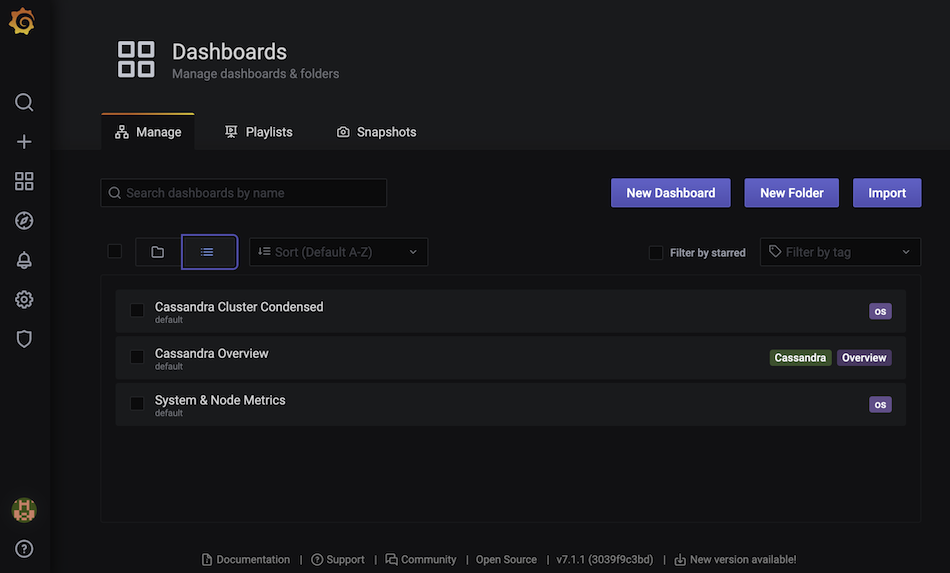
**✅ Step 2a: Add Cassandra password to manifest **
Make sure the Cassandra Operator is initialized by trying to extract the password. If this command returns an error, wait a few seconds and try it again until you see the random password.
kubectl get secret k8ssandra-superuser -o yaml | grep password | cut -d " " -f4 | base64 -d
Add the Cassandra password to the PetClinic manifest by running the following sed script.
sed -i "s/asdfadsfasdfdasdfds/$(kubectl get secret k8ssandra-superuser -o yaml | grep password | cut -d " " -f4 | base64 -d)/g" petclinic.yaml
✅ Step 2b: Deploy the PetClinic app by applying the manifest.
kubectl apply -f petclinic.yaml
📃output
ec2-user@ip-172-31-5-5:~/kubernetes-workshop-online> kubectl apply -f petclinic.yaml
deployment.apps/petclinic-backend created
service/petclinic-backend created
deployment.apps/petclinic-frontend created
service/petclinic-frontend created
ingress.networking.k8s.io/petclinic-ingress created
We can watch our app come online with the same command we used before. Just like last time use Ctrl + C to exit the watch.
watch kubectl get pods
📃output
Every 2.0s: kubectl get pods ip-172-31-5-5.eu-central-1.compute.internal: Tue Nov 17 15:28:10 2020
NAME READY STATUS RESTARTS AGE
cass-operator-cd9b57568-hcqc6 1/1 Running 0 26m
grafana-deployment-cfc94cf66-n7jk4 1/1 Running 0 21m
k8ssandra-cluster-a-grafana-operator-k8ssandra-6466cf94c9-skzrs 1/1 Running 0 23m
k8ssandra-cluster-a-reaper-k8ssandra-59cb88b674-lh6cx 1/1 Running 0 20m
k8ssandra-cluster-a-reaper-k8ssandra-schema-2p2tp 0/1 Completed 4 23m
k8ssandra-cluster-a-reaper-operator-k8ssandra-56cc9bf47c-9nt2l 1/1 Running 0 23m
k8ssandra-dc1-default-sts-0 2/2 Running 0 23m
k8ssandra-tools-kube-prome-operator-6d556b76f8-pqbmt 1/1 Running 0 26m
petclinic-backend-7d47bcc6cc-smmv7 1/1 Running 0 59s
petclinic-frontend-75b98f7f8d-x2zgk 1/1 Running 0 59s
prometheus-k8ssandra-cluster-a-prometheus-k8ssandra-0 2/2 Running 1 23m
traefik-7877ff76c9-rcm9n 1/1 Running 0 27m
✅ Step 2c: Using PetClinic
Navigate to the petclinic link in your cloud instance page to interact with the pet clinic app. If you have done everything correctly you should see the following.
If you are using your own infrastructure navigate to localhost:8080 to see the UI

Click on the pet types tab at the top of the page.

Click the add button and enter a new pet type.

Click the delete button next to "bird".

To see the original app, the Pet Clinic app Github repo is here. But, we have forked our own version for today.
✅ Step 3a: Get current running config.
For many basic config options, you can change values in the values.yaml file. Next, we will scale our cluster using this method.
Check our current running values. This command exposes all the current running values in the system.
helm get manifest k8ssandra-cluster-a
Notice how each of the yaml files that make up the deployment is displayed here and there is a bunch... Yeah Kubernetes is just an OCEAN of YAML.
✅ Step 3b: Scale the cluster up.
We can use the linux tool grep to filter the output to find specific values. To find the current number of Cassandra nodes we run the following command.
helm get manifest k8ssandra-cluster-a | grep size -m 1
Notice output size: 1.
This is the current number of cassandra nodes. Next, we are going to scale up to three nodes.
While there are a few ways to make this change with Helm, we will use a single line command that doesn't require any edits to files.
helm upgrade k8ssandra-cluster-a k8ssandra/k8ssandra-cluster --set size=3 --set ingress.traefik.enabled=true --set ingress.traefik.repair.host=repair.${ADDRESS} --set ingress.traefik.monitoring.grafana.host=grafana.${ADDRESS} --set ingress.traefik.monitoring.prometheus.host=prometheus.${ADDRESS}
Check the size again, it should be size: 3 now
helm get manifest k8ssandra-cluster-a | grep size -m 1
✅ Step 3c: Scale the cluster down
Historically, one of the most difficult operations with Cassandra has been to scale down a cluster.
With K8ssandra's dynamic elasticity, it is now just as easy as scaling up. Let's try it!
helm upgrade k8ssandra-cluster-a k8ssandra/k8ssandra-cluster --set size=1 --set ingress.traefik.enabled=true --set ingress.traefik.repair.host=repair.${ADDRESS} --set ingress.traefik.monitoring.grafana.host=grafana.${ADDRESS} --set ingress.traefik.monitoring.prometheus.host=prometheus.${ADDRESS}
Check the size again, it should be back to size: 1 now.
helm get manifest k8ssandra-cluster-a | grep size -m 1
Repairs are a critical anti-entropy operation in Cassandra. In the past, there have been many custom solutions to manage them outside of your main Cassandra Installation. In K8ssandra, there is a tool called Reaper that eliminates the need for a custom solution. Just like K8ssandra makes Cassandra setup easy, Reaper makes configuration of repairs even easier.
✅ Step 4a: Check the cluster’s health
Navigate to your cloud instance link list and click on reaper.
If you are running this locally then navigate to repair.localhost:8080/webui/
Notice way that the nodes are displayed inside the datacenter for the cluster.
The color of the nodes indicates the overall load the nodes are experiencing at the current moment.
✅ Step 4b: Schedule a cluster repair
On the left hand side, notice the schedule menu option.
Click Schedule
Click add schedule and fill out the details when you are done click the final add schedule to apply the new repair job. A Cassandra best practice is to have one repair complete per week to prevent zombie data from coming back after a deletion.
Notice the new repair added to the list.
✅ Step 4c:Run a cluster repair
On the repair job you just configured, click the Run now button.
Notice the repair job kicking off.
For more reading on Reaper, visit this link
Well that is it for today. In just a short time we have done what would have taken the better part of a week to do in the past thanks to the power of Kubernetes and Helm.
For further learning from our team, please checkout datastax.com/dev where we keep many resources and hands on labs to help you improve your skill set.
If you are looking to get certified on Cassandra, please visit https://datastax.com/dev/certifications.
To get involved in the discussion around this project and others, please check out community.datastax.com.
To learn more about K8ssandra, please checkout our website at k8ssandra.io/preview and our project github at github.com/k8ssandra/k8ssandra.

